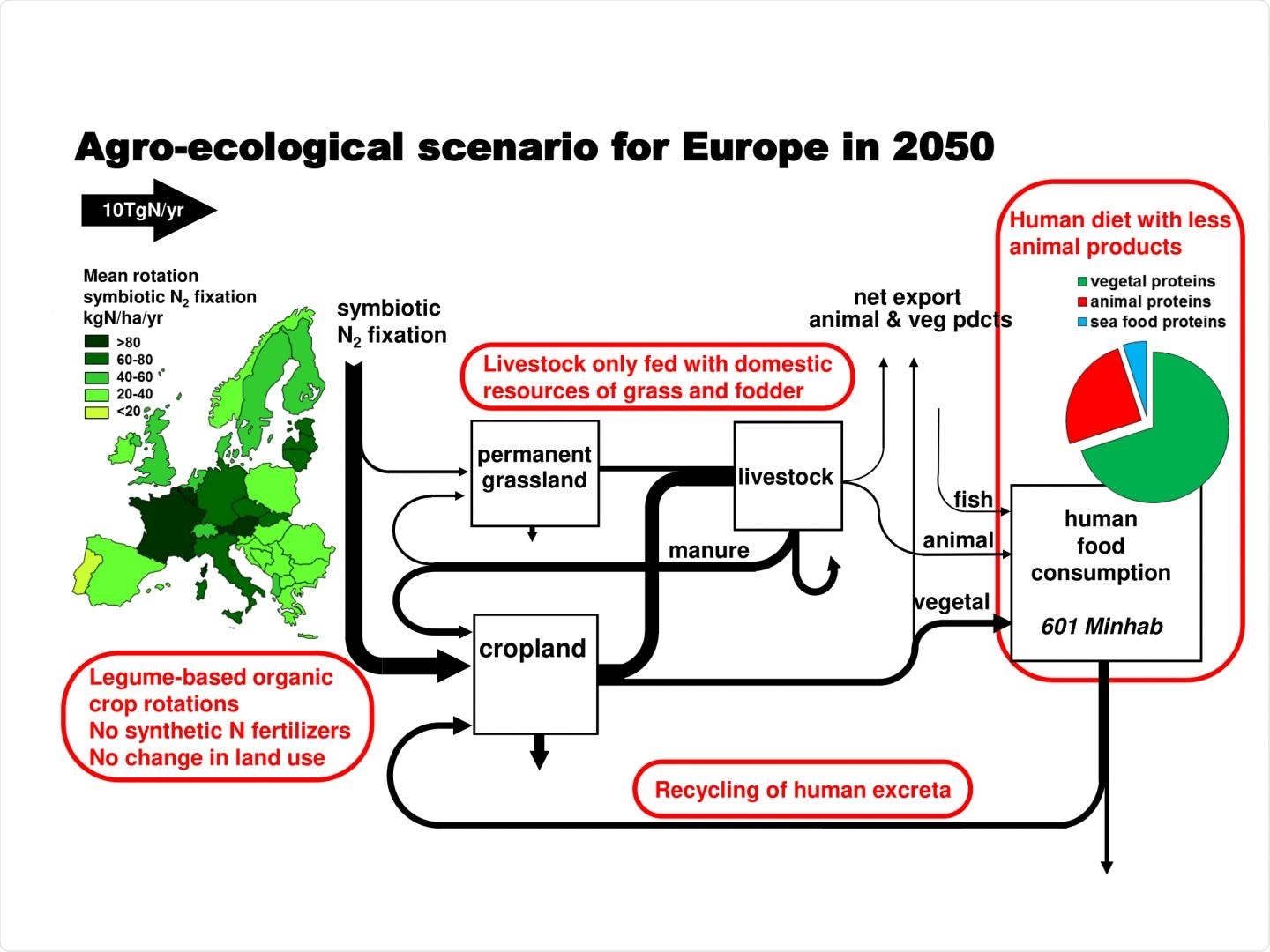Study shows that self-sustaining systems integrating diverse organic farming practices and human dietary composition could solve the issue of food security.

Farming Model. Image Credit: © Gilles Billen
Securing food production in Europe by 2050 through integrated farming
A new study published in the journal One Earth by a consortium of European scientists shows that an organic farming system integrating changes in human diet combined with the association of livestock and nitrogen-fixing legume farming could secure food production of organic produce for expected populations by 2050 across Europe.
The team of scientists was composed of the 'Environments, Transfers and Interactions in Hydrosystems and Soils' laboratory at CNRS, Sorbonne University in Paris, and EPHE, working alongside groups from Spain, Sweden, Austria, and Italy.
Researchers focused on the strategies to address food security in Europe, which is expected to be an increasingly precarious challenge. This is primarily due to the changing climate, the predicted increase of pests and pesticides, as well as the rapidly changing socioeconomic dynamics of Europe.
The scientists took a new approach looking at organic farming in continental Europe, which relies on the absence of pesticides or genetically modified crops and found promising results to secure food production by 2050.
According to the student, an organic, sustainable, biodiversity-friendly agro-food system, could be implemented in Europe and would allow a balanced coexistence between agriculture and the environment.
This model is based primarily on three levers.
Firstly, dietary changes across human populations are required. This includes reduced consumption of animal products, which in turn would limit intensive livestock farming and eliminate the majority of feed imports as regional agricultural systems would become increasingly self-sufficient.
Secondly, agroecology practices including crop rotations need to be applied extensively. This strategy relies on the planting of different crops sequentially on the same plot of land over time. It involves changing the type of crop grown yearly to maintain the soil and preserve it without pesticide use. Moreover, combining this with more nitrogen-fixing legumes could enhance this recovery capacity, making it possible to use very few fertilizers.
The final approach consists of combining crop and livestock farming. These practices are generally disconnected and are concentrated in isolation across specific regions. However, combining both in proximity could allow optimal recycling of manure to use as a natural fertilizer.
Potential implications and limitations of an integrated organic farming system
According to this scenario, the researchers predict it could be possible to feed the predicted population of 2050 across Europe and affirm Europe’s autonomy as an agricultural region. In addition, it is also predicted that exports of products such as cereals could increase, as they are needed for human consumption around the world.
Products such as cereal also reduce water pollution and greenhouse gas emissions from agriculture, which further enhances the sustainable practice of this approach.
However, certain limitations may limit the success of this system. The unpredictability of environmental change makes predictions less accurate, as crops may suffer from consequences ranging from physiological stress and reduced reproductive rates to reduced growth, which could confound estimates provided by this model. Furthermore, this continental approach fails to consider or integrate regional differences across European nations, as farming practices and socioeconomic profiles vary considerably across countries.
Ultimately, combining the approaches detailed in this study with other strategies that have been proven effective, may further enhance the potential benefits provided by the proposed integrated system.
Journal reference:
- Billen, G., Aguilera, E., Einarsson, R., Garnier, J., Gingrich, S., Grizzetti, B., Lassaletta, L., Le Noë, J. and Sanz-Cobena, A. (2021). Reshaping the European agro-food system and closing its nitrogen cycle: The potential of combining dietary change, agroecology, and circularity. One Earth, 4(6), pp.839–850.